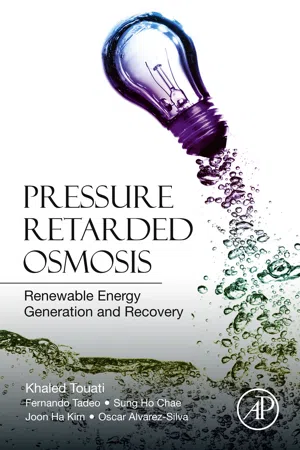
Pressure Retarded Osmosis
Renewable Energy Generation and Recovery
Khaled Touati,Fernando Tadeo,Joon Ha Kim,Oscar Andres Alvarez Silva,Sung Ho Chae
- 188 Seiten
- English
- ePUB (handyfreundlich)
- Über iOS und Android verfügbar
Pressure Retarded Osmosis
Renewable Energy Generation and Recovery
Khaled Touati,Fernando Tadeo,Joon Ha Kim,Oscar Andres Alvarez Silva,Sung Ho Chae
Über dieses Buch
Pressure Retarded Osmosis: Renewable Energy Generation and Recovery offers the first comprehensive resource on this method of generating renewable energy. Dr. Khaled Touati and the team of editors combine their expertise with contributions from other leaders in the field to create this well-rounded resource, which discusses and analyses this novel method of creating a controllable renewable energy.
The promises of the PRO technique are first clearly presented and explained, and the authors then provide a comprehensive analysis of the issues that remain such as Concentration Polarization, Membrane Deformation, and Reverse Salt Diffusion. Possible solutions to these issues which often restrict industrial implementation are then discussed to mitigate these detrimental effects, and there is also an emphasis on the recovery of energy from desalination processes using PRO, which is able to reduce energy consumption and make it more economically and environmentally efficient.
- Combines research with experience to deliver a complete resource on Pressure Retarded Osmosis
- Discusses all areas of PRO in detail
- Offers solutions to problems commonly experienced and summarizes each method with a clear and concise conclusion
- Includes case studies from the Great Salt Lake (U.S.A) and Dead Sea (Asia), as well as other rivers from America, Europe, and Asia
Häufig gestellte Fragen
Information
Pressure Retarded Osmosis as Renewable Energy Source
Abstract
Keywords
1. Introduction
Inhaltsverzeichnis
- Cover image
- Title page
- Table of Contents
- Dedication
- Copyright
- Preface
- Acknowledgments
- Introduction
- Chapter One. Pressure Retarded Osmosis as Renewable Energy Source
- Chapter Two. Water and Salt Fluxes in Pressure Retarded Osmosis
- Chapter Three. Effects of the Temperatures on PRO
- Chapter Four. Integration of PRO into Desalination Processes
- Chapter Five. Implementing Salinity Gradient Energy at River Mouths
- Index